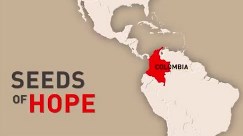Malteser International Americas Apiculture Program has Farmers 'Buzzing' in Northern Colombia

Traditional farmers are "pollinators" of hope and opportunity for other farmers who want a better, more sustainable future
Contact: Jill Watson, Communications Manager, 305-448-5111, 305-590-1818, jill.watson@malteser-international.org
MIAMI, April 17, 2017 /Standard Newswire/ -- Climate change has been devastating to traditional indigenous famers in northern Colombia, causing disastrous droughts and stripping their livelihood from their grasp with little hope for a secure future in agriculture.
To counter the effects of climate change and reduce its impact on vulnerable communities and economies, Malteser International Americas, the humanitarian relief agency of the Order of Malta, is working with a group of 10 farmers in Colombia to bolster their traditional skills and add new, innovative apiculture (beekeeping) skills to their craft, to preserve their livelihood and to create better, healthier futures.
The novice beekeepers are from the regions of La Guajira and Magdalena in northern Colombia, and they all received specialized training in apiculture and sustainable agriculture. They were also taught how to preserve and protect their increasingly scarce natural resources through best agriculture practices. The first group of farmers acts as advocates of apiculture in their communities to educate interested farmers in the art of beekeeping as a sustainable way of life. Essentially, the farmers will be "pollinators" of hope and opportunity for other farmers who are looking for a better, more sustainable future.
"In Colombia, Malteser International Americas' apiculture program helps to conserve and replenish the environment and achieve climate change adaption in a region feeling the effects of various climate impacts," said Ravi Tripptrap, Executive Director, Malteser International Americas.
"Beekeeping also provides an alternative livelihood to a traditional farmer, who has seen an economic downturn from drought, and it also generates additional income for rural and indigenous communities, many of whom have been internally displaced," said Jelena Kaifenheim, Regional Manager, Latin America / Caribbean, Malteser International Americas.
Luz and Jairo Linares, a husband and wife team who survive off of the land, make a living as traditional farmers. Increased climate change effects, such as long-standing droughts, the drying up of rivers, and a depletion of sustainable crops to harvest, have caused problems for the family. With their traditional farming output on the decline and their livelihood threatened, Luz and Jairo turned to Malteser International Americas' innovative beekeeping program in Colombia as a new source of income. (Watch "Seeds of Hope: The story of Luz and Jairo, beekeepers in Colombia")
"Malteser International's beekeeping program has given us a new stream of income," said female beekeeper Luz Linares. "We once thought bees were an insignificant animal, but then we learned about what they produce. And when we sell the honey, we have a better quality of life."
"I have dedicated my life to the care of bees," said Jairo Linares. "The more hives we have, the better off we will be."
The Linares family and the rest of the Colombian beekeepers manage wooden hives of the small, stingless Tetragonisca angustula bee, which produces a large amount of honey. The honey is known in the region as "miel de angelita", which means "little-angel honey." In Colombia, the price of this particular honey can be as much as ten times more than the price of honey produced by common honey bees.
Overall, nearly 4,000 people benefit and see an improvement in livelihood from the organization's climate change adaptation programs in northern Colombia.
Last year, Malteser International Americas was at the helm of international relief and tackled some of the greatest challenges facing the Americas. In Colombia, the organization:
· Protected 1,200 pregnant women and their unborn babies from the Zika virus by providing prevention kits to often neglected populations where stagnant water is an ideal breeding ground for mosquitos;
· Improved community-based health in 20 indigenous communities by training community health agents and saved 700 undernourished children with food support and training on nutrition of their mothers and other women in the community.
· Provided support for clean-up measures in northern Colombia following floods resulting from Hurricane Matthew and distributed mattresses and 200 hygiene kits to affected families.
About Malteser International Americas: Malteser International Americas is an affiliate of Malteser International, the humanitarian relief organization of the Order of Malta. Through our U.S. headquarters, Malteser International Americas provides immediate disaster response and preparedness, as well as vital healthcare and nutrition, and clean water and sanitation to vulnerable people in North America, Latin America and the Caribbean. Visit www.orderofmaltarelief.org to learn more.




 Sign Up to Receive Press Releases:
Sign Up to Receive Press Releases: